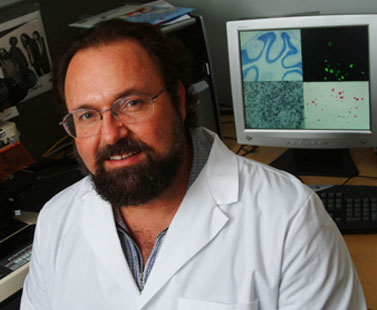Dr. Morgan named chief scientific officer at Byrd Institute

David Morgan, PhD
David Morgan, PhD, professor of molecular pharmacology and physiology, was recently named chief scientific officer at the USF Health Byrd Alzheimer’s Institute.
The Byrd Institute this month was legislatively established as a center within USF, and Dr. Morgan will oversee both clinical and basic research at the facility, said Stephen K. Klasko, MD, MBA, CEO for USF Health and the Byrd Institute. A leading neuroscientist in the field of Alzheimer’s research, he will also continue his duties as the director of basic neuroscience research for the College of Medicine.
Dr. Morgan said he plans to work with colleagues at USF Health to make progress on three initiatives over the next year:
• Creating a state-of-the-art center for the diagnosis of Alzheimer’s and other dementias, and using this knowledge to deliver the right drugs to the right patients.
• Building a research team of highly interactive scientists, each of whom works on a different piece of the Alzheimer’s puzzle and understands how to share this expertise with others.
• Starting a patient-dignity initiative that uses students to help patients find their way through the maze of medical offices and procedures and advises patients and families about what to expect during their clinical visits.
Our success will require support from federal, state and private philanthropic sources,” Dr. Morgan said. “We want to create a first-class center for the 21st century that will be ranked among the world’s leading Alzheimer’s research centers – where scientists in our laboratories upstairs can rapidly test their ideas with patients seen in our clinics downstairs.”
Dr. Morgan joined USF in 1992 from the University of Southern California School of Gerontology. He holds a PhD degree in neurobiology from Northwestern University and completed a postdoctoral fellowship in neurogenerontology at USC.
Working with USF colleagues, Dr. Morgan was instrumental in creating a mouse genetically modified to develop Alzheimer’s-like symptoms early in life. Using this Alzheimer’s mouse model, Dr. Morgan’s research focuses on testing therapies that could delay or prevent Alzheimer’s disease, determining the role that inflammation plays in the brain, and exploring the development of antibodies to prevent the buildup of beta-amyloid, the substance that clumps into plaques in the brains of Alzheimer’s patients. He is a recipient of research grants from the National Institute on Aging and the American Federation of Aging Research. His work has been published in Science, Nature and Journal of Neuroscience.
In other news at the USF Health Byrd Institute:
• Amanda Smith, MD, interim director of the Eric Pfeiffer Suncoast Alzheimer’s and Gerontology Center, is taking on a new role as medical director of the Byrd Institute. She’ll be responsible for the clinical operations there.
• Huntington Potter, PhD, professor of molecular medicine, will continue his work as director of the Alzheimer’s Disease Research Center, a statewide project sponsored by the National Institute on Aging and housed at the Byrd Institute.
• A new board has been formed to advise Dr. Klasko on scientific issues. Dr. Clifton Gooch, MD, professor and chair of neurology, will chair the Byrd Institute Scientific Advisory Board. Other board members are Robert Deschenes, PhD; David Diamond, PhD; Francisco Fernandez, MD; Junius Gonzales, Bruce Lindsey, PhD; Dr. Morgan, Huntington Potter, PhD; Paul Sanberg, DSc, PhD, and Dr. Smith.

